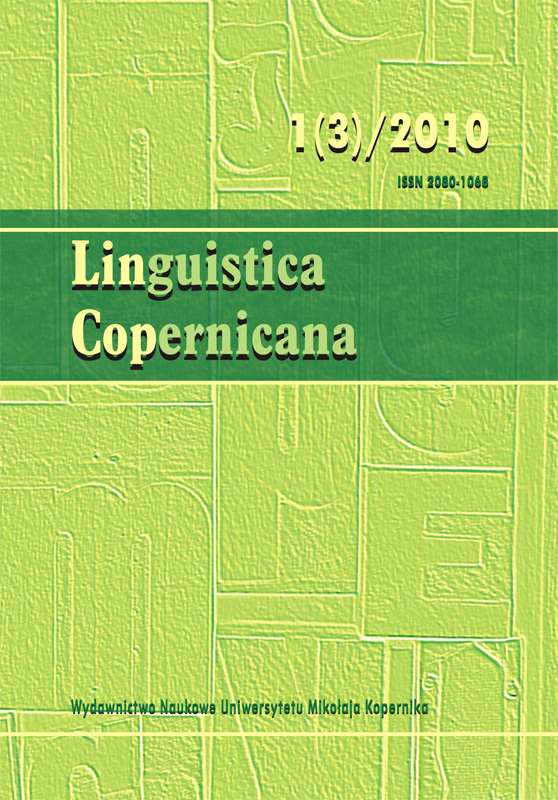‘Więcej’ wśród aspektów prymitywu ‘wie, że’
DOI:
https://doi.org/10.12775/LinCop.2010.002Słowa kluczowe
proporcja, liczebnik, zbiór, ilość, liczba, miara, gradacja, nierównoliczność, równoliczność, przybliżenieAbstrakt
In the essay an attempt is being made to view expressions denoting quantity, numbers, measures and gradation as inalienably rooted in what the author takes to be the primordial, universal and indefinable phenomenon, as well as concept / expression, whose main English linguistic shape (in its shortest version) is know(s) that. The central item embodying the essence of the quantity aspect of ‘knowledge’ (the latter concept being taken to entail, in accordance with Aristotle’s insight, the basic status of multiplicity, rather than individuality) appears to be the expression more (than). The author examines both this crucial item and a number of related expressions, mainly Polish ones, but also some English, Russian and other ones, in their interaction. He discusses, among other things, the widely debated issues concerning the quantifiers all and some, as well as the relationship between “exact” numerical descriptions of sets, on the one hand, and the ‘at least’ and ‘at most’ numerical statements, on the other hand (here, polemical remarks concerning, inter alios, Levinson’s, Carston’s and Burton-Roberts’ views, are formulated). Much space has been devoted to multifarious approximative expressions. One of the several interesting particularities in the vast realm of quantity expressions that have attracted the author’s attention is the truly idiosyncratic Russian expression in the form of the comparative adjectival prefix po-, cf. podlinnee; the author discusses Boguslavskij, Iomdin’s (2009) analysis of the prefix, while trying to defend the claim of its monosemy and to offer a positive account of its meaning.
Bibliografia
Boguslavskij I. M., Iomdin L. L., 2009, Semantika smjagčennoj sravnitel’nosti: russkie komparativy na po-, w: T. Berger, M. Giger, S. Kurt, I. Mendoza (red.), Von grammatischen Kategorien und sprachlichen Weltbildern – Die Slavia von der Sprachgeschichte bis zu Politsprache. Festschrift für Daniel Weiss zum 60. Geburtstag, München–Wien: Wiener Slawistischer Almanach. Sonderband 73, s. 29–52.
Bogusławski A., 1966, Semantyczne pojęcie liczebnika i jego morfologia w języku rosyjskim, Warszawa: Ossolineum.
Bogusławski A., 1975, Measures are measures. In defence of the diversity of positives and comparatives, Linguistische Berichte 36, s. 1–9.
Bogusławski A., 2004, Mianowicie jako deklaracja rzeczowego potwierdzenia, w: A. Moroz, M. Wiśniewski (red.), Studia z gramatyki i semantyki języka polskiego, Toruń: Wyd. UMK, s. 205–222.
Bogusławski A., 2007, A Study in the Linguistics-Philosophy Interface, Warszawa: BEL Studio.
Bogusławski A., 2008, O konieczności istnienia, Warszawa: BEL Studio.
Bogusławski A., 2009, Myśli o gwiazdce i o regule, Warszawa: BEL Studio.
Bogusławski A., Karolak S., 1970, Gramatyka rosyjska w ujęciu funkcjonalnym, Warszawa: Wiedza Powszechna.
Burton-Roberts N. (red.), 2007, Pragmatics, New York: Palgrave Macmillan.
Burton-Roberts N., 2007, Varieties of semantics and encoding: negation, narrowing/ loosening and numericals, w: N. Burton-Roberts (red.) 2007, s. 90–114.
Carston R., 1991, Implicature, explicature and truth-theoretic semantics, w: S. Davis (red.), Pragmatics: a Reader, Oxford: Oxford UP, s. 33–51.
Carston R., 1998, Informativeness, relevance and scalar implicature, w: R. Carston, S. Uchida (red.), Relevance Theory: Implications and Applications, Amsterdam: Benjamins, s. 179–236.
Chomsky N., 1984, Modular Approaches to the Study of the Mind, San Diego: State UP.
Danielewiczowa M., 2009, Zagadkowe dosłownie, w: J. Chojak, T. Korpysz, K. Waszakowa (red.), Semantyczno-pragmatyczna analiza słownictwa i wypowiedzi. Księga pamiątkowa Profesor Jadwigi Puzyniny, Warszawa: Wydział Polonistyki UW, s. 293–305.
Doboszyńska-Markiewicz K., 2007, Co łączy około i bez mała? Kilka uwag o operatorach adnumeratywnych, Prace Filologiczne LII, s. 39–50.
Duszkin M., 2008, Wykładniki przybliżoności adnumeratywnej w języku polskim i rosyjskim. Rozprawa nieopublikowana.
Gilson E., 1975, Lingwistyka i filozofia. Rozważania o stałych filozoficznych języka, Warszawa: Instytut Wydawniczy PAX.
Grochowski M., 1998, Około als Vertreter der Klasse der adnumerativen Operatoren, w: M. Grochowski, G. Hentschel (red.), Funktionswörter im Polnischen, Oldenburg: Bibliotheks- und Informationssystem der Universität Oldenburg, s. 99–117.
Grochowski M., 2005, O cechach gramatycznych i znaczeniu jednostek o postaci trochę, w: M. Grochowski (red.), Przysłówki i przyimki. Studia ze składni i semantyki języka polskiego, Toruń: Wyd. UMK, s. 101–111.
Janus E., 1981, Wykładniki intensywności cechy (na materiale polskim i rosyjskim), Wrocław: Ossolineum.
Janus E., 1991, Analitičeskaja sravnitel’naja stepen’ v pol’skom i russkom jazykach. Sowremennoe sostojanie i istorija, Warszawa: IBL PAN.
Levinson S. C., 2000, Presumptive Meanings. The Theory of Generalized Conversational Implicature, Cambridge, Mass.: The MIT Press.
Mel’čuk I., 1985, Poverchnostnyj sintaksis russkich čislovych vyraženij, Wien: Wiener Slawistischer Almanach, Sonderband 16.
Noveck I., Sperb er D., 2007, The why and how of experimental pragmatics: the case of ‘scalar inferences’, w: N. Burton-Roberts (red.), 2007, s. 184–212.
Ortega y Gass et J., 2004, Ewolucja teorii dedukcyjnej. Pojęcie zasady u Leibniza. Gdańsk: Wyd. słowo / obraz terytoria.
Vinogradov V. V., 1972, Russkij jazyk. Grammatičeskoe učenie o slove, Izd. 2, Moskva: Nauka.
Pobrania
Opublikowane
Jak cytować
Numer
Dział
Statystyki
Liczba wyświetleń i pobrań: 770
Liczba cytowań: 0



